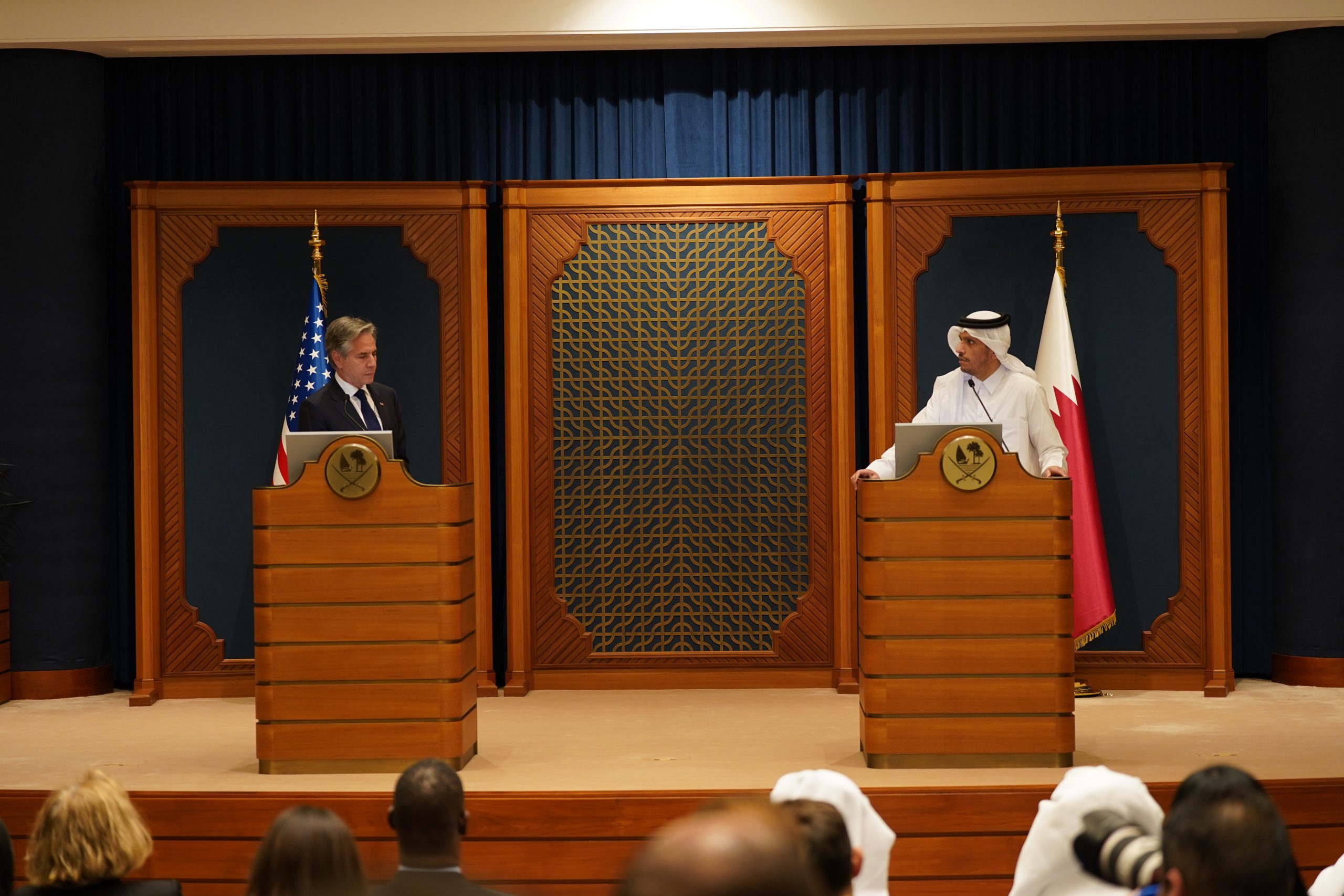The top Qatari and U.S. officials underscored the need to reach a deal between Israel and Hamas that would halt the war in Gaza as prevent further regional escalations.
The United States said that Hamas had presented “additional amendments” to its ceasefire proposal, noting that some were feasible while others were not.
The comments came from U.S. Secretary of State Antony Blinken, who was speaking in a joint press conference at the Amiri Diwan in Doha with Qatar’s Prime Minister Sheikh Mohammed bin Abdulrahman Al-Thani.
“Hamas has proposed numerous changes to the proposal that was on the table,” Blinken told the press in Doha. “We discussed those changes last night with our Egyptian colleagues and today with the [Qatari] prime minister. Some of the changes are workable, some are not.”
“Israel has accepted the proposal as it was, as it is. Hamas didn’t,” Blinken said, despite Israel still not providing a formal response.
Blinken’s visit to Doha on Wednesday, his fourth since October 7, came just a day after Hamas and the Palestinian Islamic Jihad responded to Washington’s ceasefire proposal through mediators Qatar and Egypt.
On May 31, U.S. President Joe Biden presented the ceasefire proposal, entailing a three-phased deal that would pave the way for a complete ceasefire in the Gaza Strip and the withdrawal of Israeli forces.
Blinken pinned the blame on Hamas for the delay in reaching an agreement. He also claimed that Israel had already accepted the proposal, despite conflicting statements by Israeli officials on the matter amid a divide between the government’s members.
“A deal was on the table that was virtually identical to the proposal that Hamas put forth on May 6th, a deal that the entire world was behind, a deal that Israel has accepted and Hamas could have answered with a single word: ‘yes’,” Blinken said.
Speaking alongside Blinken, Sheikh Mohammed, who is also Qatar’s foreign minister, said the mediators are still working to bridge the gaps between Israel and Hamas until a deal materialises.
Sheikh Mohammed noted that there has been “a shift in this conflict in the recent period and there is a clear and firm call” to halt it.
Blinken’s stopover in Qatar came as part of his eighth regional tour since the beginning of the war, where he stopped in Egypt, Israel and Jordan.
During a humanitarian conference for Gaza held in Jordan’s Dead Sea, the U.S. announced an additional $404m in new aid to Palestinians while continuing to suspend funds to the United Nations’ Palestinian refugees agency (UNRWA).
Washington, UNRWA’s largest donor, had halted aid to the agency in January following uncorroborated Israeli claims over its staff’s alleged involvement in the October 7 Hamas attack on Israel.
Blinken’s latest regional tour also comes amid increased Israeli attacks on the Gaza Strip, particularly in the southern city of Rafah and the middle areas.
More than 37,000 people have been killed by Israel since the start of the war. Almost all of the Gaza Strip’s 2.3 million population are displaced.
Sheikh Mohammed underlined the dire humanitarian conditions in Gaza, noting that the suffering has only exacerbated eight months on.
“Unfortunately, we’ve seen the catastrophe increase day after day and we see more casualties, especially among civilians in the Gaza Strip, whether children and women. Without a doubt, we need to take a clear position and demand an end for this war,” he said.
On June 12, the UN added the Israeli military to “parties that commit grave violations affecting children in situations of armed conflict,” a move that angered Israel.
When asked about Washington’s view over Israel’s conduct of war, Blinken appeared to deflect from providing a direct response by maintaining his country has its own monitoring process to ensure its ally does not violate humanitarian laws.
“We look and continue to look very carefully at international humanitarian law[…]and we have our own processes within the U.S. administration, including my own department, to assess whether Israel or any other combatant in any other conflict is adhering to those,” Blinken said.
Hezbollah-Israel cross border attacks intensify
Meanwhile, southern Lebanon has been an area of high tensions amid ongoing cross-border attacks between Hezbollah and Israel.
Wednesday witnessed heightened tensions after Hezbollah fired 170 rockets and missiles on northern Israel, in response for the killing of the movement’s top commander Taleb Abdullah on Tuesday night.
“If the enemy is screaming and moaning about what happened to it in northern Palestine, let him prepare himself to cry and wail,” Hezbollah official Hashem Safieddine said during the funeral procession of Abdullah.
The flare-up in southern Lebanon and other parts in the region, including the Red Sea, was triggered by Israel’s assault on the Gaza Strip. Since October 7, Israel has killed more than 400 people in southern Lebanon while displacing some 93,000 others.
Sheikh Mohammed stressed that the region is at a crucial juncture, calling for the need to have a deal that would halt regional escalations.
“We’re living at very critical times and we believe that reaching a deal is important and this deal will save the innocents’ lives and will also save the whole region, which is on the verge of collapse and explosion,” the top Qatari official said.
In 2006, Israel waged a 34-day war on Lebanon, killing 1,200 mostly Lebanese civilians. The war ended with Hezbollah forcing Israeli soldiers out after weeks of intense attacks.
Concerns over the breakout of another war have been on the rise, with Israel repeatedly threatening to wage an all-out war.
Blinken added that the U.S. has been working to prevent the outbreak of a new war, saying “no one is looking to start a war or having an escalation”.







